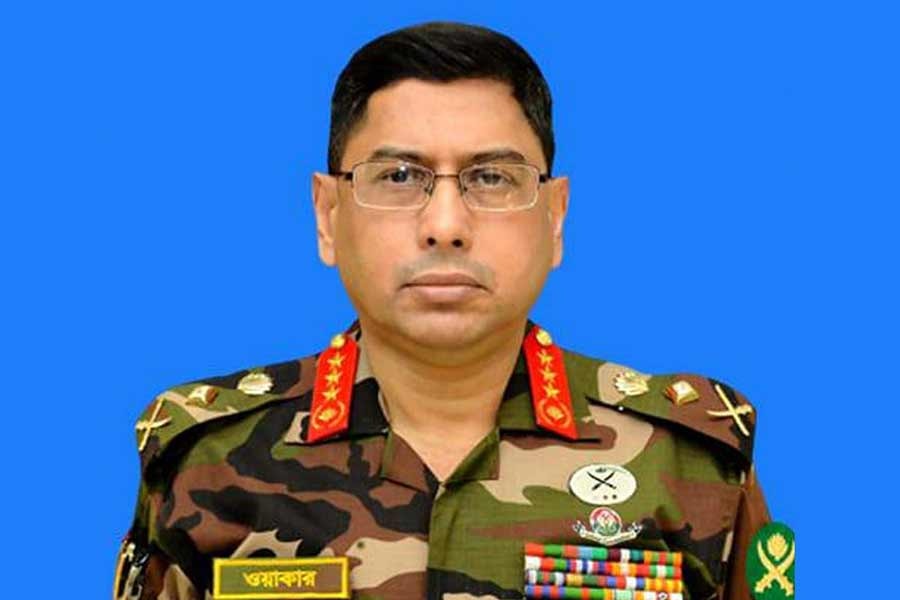Political mud-slinging, bickering threatens to undermine sovereignty: army chief

Published :
Updated :

Army Chief General Waker-Uz-Zaman has called on all parties to stop the “fighting, bickering and mud-slinging” as he outlined his hope for elections by December.
He warned that political hostilities would “endanger” the country’s independence and sovereignty, and said: “I am telling you this today, otherwise you’ll say I didn’t warn you.”
Speaking at an event at Raowa Club in Mohakhali on Tuesday to commemorate the officers martyred in the Pilkhana massacre, Waker stressed the need for a “fair and inclusive” election.
“Before the election, the government must ensure any necessary reforms are made. We, the joint forces, have discussed this with [Chief Advisor Muhammad] Yunus.”
The army chief added that the head of the interim government has also agreed to hold elections by December, saying, “I initially mentioned elections would be held within 18 months, and it seems the government is moving in that direction. Dr Yunus is doing his best to keep the country united, and we must support him to succeed.”
“We must work toward a future where we can live as a united nation, without fighting or arguing among ourselves. We may have differing opinions and ideologies, but at the end of the day, we must prioritise the country and the nation so that we can stay united.”
Waker emphasised that only unity can lead to the country’s development and good governance. “Otherwise, we’ll fall into more problems. We don’t want that. I am warning you now. Don’t say I didn’t warn you later. If we don’t set aside our divisions and work together, if we keep engaging in mud-slinging, fighting, and bickering, the country’s independence and sovereignty will be at risk.”
“This country belongs to all of us. We all want to live in peace and happiness, and that is what we are working towards.”
‘NO DOUBT ABOUT WHO CARRIED OUT PILKHANA MASSACRE’
The army chief also said the Pilkhana massacre in 2009 was carried out by the “then members of the Border Guard Bangladesh”.
“Period. There are no ifs or buts in this,” he said on the newly proclaimed “National Martyred Army Day” to commemorate the lives lost during the BDR mutiny.
He warned against questioning this fact, saying, “Bringing any doubts or conditions into this will only hinder the judicial process for those who have been behind bars for 16-17 years and those who have already been sentenced.”
“We must remember this clearly—do not disrupt the judicial process,” he urged.
A total of 74 people, including 57 army officers, were killed in a bloody mutiny at the BGB Headquarters in Dhaka’s Pilkhana on Feb 25 and 26, 2009, sending shock waves around the world.
Following the tragedy, the Bangladesh Rifles frontier force was rechristened as Border Guard Bangladesh, or BGB, and its logo and uniform were changed.
Although the mutiny-related trials took place in BGB courts and the killings in conventional courts, the demand for a reinvestigation gained traction under the interim government after a writ petition was filed in the Supreme Court in November.
The interim government formed a seven-member probe committee in December last year.
On Tuesday, the army chief said: “Those who were penalised deserve it. We’ve formed a commission to figure out whether political leaders or outside forces were involved in this. The commission will figure it out and let you know.”
“The bottom line is that the proficient soldiers who lost their lives [during the mutiny] were killed by the bullets of the then members of the BDR. Some of us have expressed different views about these matters, trying to slip this issue into something different altogether. That will not bode well for us,” he added.
Waker explained that some individuals who were convicted had claimed they received different punishments since 2009, with some of those being imposed arbitrarily.
“I’ve formed a board for this. A lieutenant general is a member of the board. They’ve made recommendations regarding 51 [soldiers] in the first phase and I’ve accepted most of them. The Navy and Air Force are also working on this.”
He emphasised that those involved in criminal activities would not receive any leniency, stressing that discipline must remain the core focus of the forces.
“At this critical juncture in our nation’s history, many forces and organisations have been devastated. Only the army, Air Force, and Navy have remained intact. Why? Because of discipline,” he said.
“I’ve ordered my officers that if there is even the slightest doubt about actions taken against anyone, whether it is a criminal or not, the decision will go in favour of the individual.”
“I want us to return to the cantonment, leaving the country and the nation in a better place.”
Addressing the worsening law and order in the country, Waker said that everyone seemed preoccupied with “rioting” and “speaking ill of others.”
“This is a fine opportunity for criminals. Because of the lawlessness, they know very well that they can get away with such crimes.”
“If we stay organised and united, we can deal with this together.”
He underlined the role police, RAB, BGB, DGFI, NSI and other security forces played in tandem with civilians to ensure security in the past.
Mentioning that crimes must never go unpunished, he said: “Otherwise it will happen again. We want to stop it once and for all. But before that we’ve to remember to do the task in a way so that these [security] organisations are never undermined.”


 For all latest news, follow The Financial Express Google News channel.
For all latest news, follow The Financial Express Google News channel.